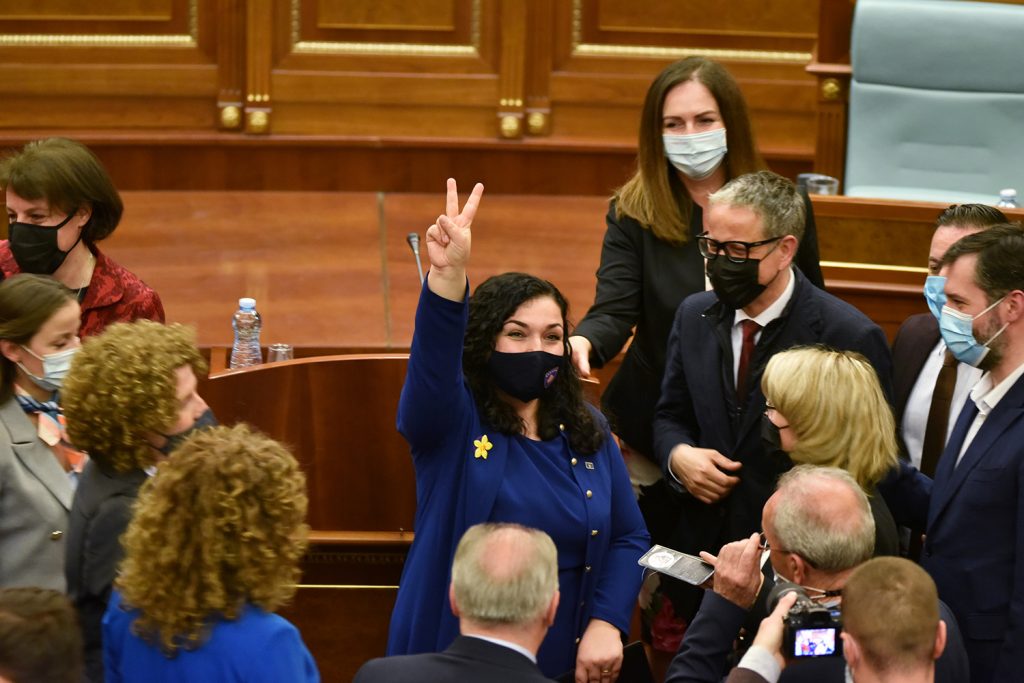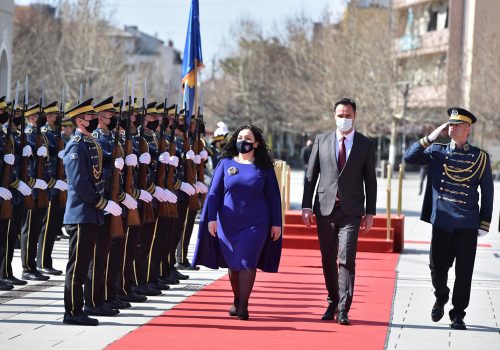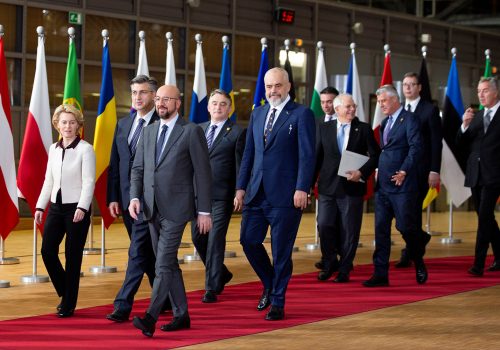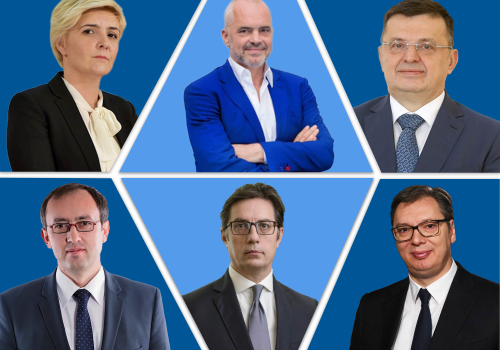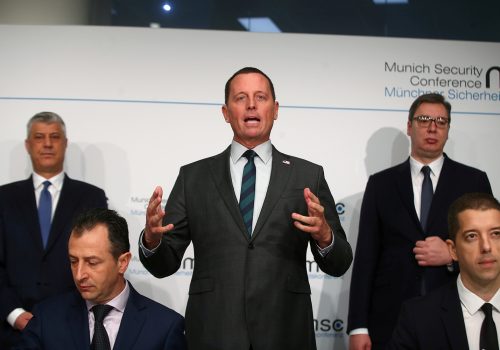As Kosovo President Vjosa Osmani faces rule of law challenges, high unemployment rates, and a slow vaccine rollout, she’s putting domestic reforms at the top of her priorities—even ahead of the country’s European Union-facilitated dialogue with Serbia.
“If I would get a guest in my office saying, ‘What about the dialogue [with Serbia]?’ My answer [is], ‘What about the vaccines?’” she told the Atlantic Council at a Front Page event last week moderated by Damon Wilson, executive vice president of the Council. She later added that “during a pandemic, where people have lost lives and those who have survived have lost jobs, our focus is clear… It’s about people.”
She said that she rejected the idea that Kosovo’s “entire foreign policy, our entire international relations, should be redundant and reduced to relations with only one country,” even though she acknowledged that the dialogue with Serbia is still “extremely important.”
Ahead of the bilateral talks, which are resuming this week, Osmani claimed that “Kosovo is going [in] all prepared with the intention of contributing to a qualitative, final agreement that is centered around mutual recognition.” But she argued “it’s about time that Serbia actually decides what does it want,” and that it “cannot really sit on two chairs at the same time. You cannot flirt with Russia—militarily, politically, economically, and [in] other areas—and at the same time say that you believe in EU values.”
Here are some of the key takeaways from the conversation, which focused on Kosovo’s domestic reforms, its strategy for joining NATO, and its relationship with the United States.
Watch the full event
First: improvements at home
- Osmani outlined two priorities for her presidency: securing the rule of law and justice, as it is “a precondition for every other area,” and creating new jobs, as “Kosovo has quite a high rate of unemployment even thirteen years after [its] Declaration of Independence, especially among youth and women.”
- She wants to redesign Kosovo’s budget, moving money from infrastructure projects to investments in human capital through the education and health systems. Her goal is to triple the health sector’s budget. “We’ve inherited a health system that was near collapse even without the pandemic,” she said, adding “we need to have a healthy population so that [the] population can become productive because only a healthy population can help the economy of the country.” As for education, “if it is quality, [it] can transform a country. It can make it more democratic, it can make it more open as a society, and it can really transform it economically,” she said.
- As Kosovo attempts to emerge from the pandemic, Osmani does not think international initiatives to distribute vaccines have always been equitable. “In our area, some of the countries that were doing really well were getting more vaccines than countries like Kosovo and Bosnia that were really far behind,” she said. Osmani hailed the Biden administration’s recent announcement that it would allocate vaccines to Kosovo but warned the EU that if it “really wants to be taken seriously in this region, it should not forget about the Western Balkans as part of it in terms of planning for a vaccination.”
- While she aims to “tackle the daily acute problems of [Kosovo’s] citizens” and improve investment in education and health, Osmani acknowledged, “it’s not like the globe is going to wait for us to tackle all of the domestic problems and only then focus on our foreign policy.”
Kosovo has its sights set on joining NATO
- Osmani said Kosovo has two strategies in its attempt to secure its membership in NATO. First, the country is trying to improve its security force based on NATO standards and is participating in NATO’s military exercises like Defender Europe 21. Osmani believes that Kosovo’s position in peacebuilding has flipped: Whereas NATO had sent peacekeepers to Kosovo in 1999, now “we are actually exporting stability by having Kosovo soldiers serve in the Middle East and other places where we can contribute to peacekeeping.”
- Osmani’s second strategy: “Working with members of NATO individually to explain why it is so important, not just for Kosovo but for the security of the entire region, that Kosovo joins the Alliance.”
- She singled out the United States, and President Joe Biden, as one of Kosovo’s key supporters in NATO. “[Biden] is one of the people, if not the person, in the United States that knows Kosovo best,” she said, adding that she is confident that Biden will continue to support Kosovo “on its path towards strengthening its statehood [which] includes recognitions bilaterally as well as memberships multilaterally.” She continued that “to have Kosovo be a member of NATO would be not just Kosovo’s success but a stamp to the United States’ success in the world as well.”
- She said Biden’s appearance at Monday’s NATO Summit solidifies the importance of United States and European cooperation and brings hope as the Western Balkans “has suffered at times when such transatlantic cooperation was not at its best.”
A bumpy ride with neighbors
- Kosovo considers it important that all members of the Western Balkans 6 cooperate economically, Osmani said. To that end, member countries have created a regional economic area and struck the Central European Free Trade Agreement. But Osmani cautioned that “countries need to respect what they sign” and claimed that “none of these were in fact implemented in practice [by Serbia].”
- When asked whether Kosovo’s neighbors could help in the country’s fight against corruption, Osmani said she is “a strong believer of cooperation in every area in the region, but especially… joint rule of law efforts.” In 2018, Kosovo failed to join the International Criminal Police Organization (INTERPOL), after Serbia, supported by Russia, had allegedly lobbied against Kosovo’s entry. Osmani said that membership in INTERPOL and Europol is important for Kosovo to fight corruption.
- Osmani said that Kosovo is adopting legislation to tackle corruption and will be implementing a vetting process in its justice ministry. “You need to have people with integrity everywhere, not just in one institution, because the chain is broken somewhere; they’re not going to be able to move on,” said Osmani. “When we [have] an independent, apoliticized justice system that is based on integrity at its core, will we show to the rest of the world that, yes, we can stand on our own feet.”
Read the transcript
Katherine Walla is assistant director of editorial at the Atlantic Council.
Further reading
Image: Kosovo President Vjosa Osmani waves during her swearing-in ceremony at parliament in Pristina, Kosovo on April 4, 2021. Photo via REUTERS/Laura Hasani.
